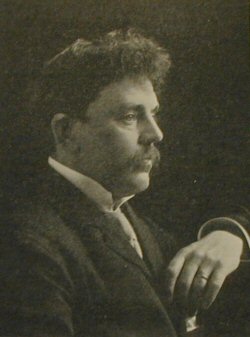 PHILIP E. HALSTEAD
PHILIP E. HALSTEAD PHILIP E. HALSTEAD
PHILIP E. HALSTEAD MR. HALSTEAD was born at Blackburn, Lancashire, in 1866.
His father was an enthusiastic amateur violinist, leader of the Blackburn
Amateur Orchestral Society, and as the whole family was musical the future
pianist was reared in an atmosphere of the art. The fact that he was invariably
the accompanist of the little group in their family concerts probably decided
Mr. Halstead's bent towards the piano, and planted the seeds of his love for
chamber music, the most exacting and exquisite of all musical forms. When he was
fourteen his father died, and four years later Mr. Halstead finally broke with
the original design of entering the church, and enrolled as a student of the
piano at the Leipzig Conservatorium. There he studied under Reinecke and
Zwintscher for piano, and under Jadassohn for composition. Before the end of his
first year he was awarded, without formal examination, the Mozart Scholarship,
and family circumstances making it doubtful whether he could continue his
studies, he was offered by the Directors a free studentship, which he accepted.
Further, at the opening of the new Conservatorium, he was selected out of six
hundred students to play the D Minor Concerto of Mendelssohn.
From Leipzig he went to Paris, but after relinquishing
teacher after teacher in disappointment, the great Marmontel of the
Conservatoire informed him that in order to gain the graces of the Parisian
School, he must first get rid of the methods painfully acquired at Leipzig!
Perceiving there was little to gain in Paris, he returned
from the Continent and settled in Glasgow, where he was soon recognised as a
notable addition to the ranks of the city's serious musicians. Two years later,
however, he went to Weimar, to study still further under Liszt's famous pupil
and successor Bernhard Stavenhagen, then pianist at the Grand Ducal Court.
During two years there he added to his earlier classical training the emotional
spirit which since Liszt's time has dominated the art of the piano. Since then
he has been resident in Glasgow, and has occupied from the first a foremost
place both as an artist and as a teacher of his art. His appearances at Glasgow
Orchestral Concerts have been marked by invariable mastery and success, and
occasionally, upon sudden calls, he has shown his ability under most adverse
conditions. His chamber concerts, also, in collaboration with the well-known
violinist, Mr. Henri Verbrugghen, are among the most cherished events of the
Glasgow musical season. In 1907 the two musicians achieved a very notable
success, first in Glasgow and afterwards in London, by the performance of all
the Beethoven sonatas for piano and violin; and they have followed this with a
series of remarkable historical recitals shewing the development of the sonata,
from Bach, through the classicists and romanticists, to Richard Strauss.
His summers Mr. Halstead spends at the country seat of his
wife's family near Helsingfors, Finland, or at Weimar. There he has leisure to
indulge in the pleasures of composition, study, and practice. Some of these
compositions, for flute and piano, have been written for playing with his
brother, Mr. Alfred Halstead, the well-known flautist, but so far all of them
have been rigorously withheld from publication.
Mr. Halstead is an enthusiastic angler, but though he is by
no means without skill in the craft, he finds it often more easy to play a
Beethoven sonata than to catch a good basket of trout.
Back to
Index of Glasgow Men (1909)